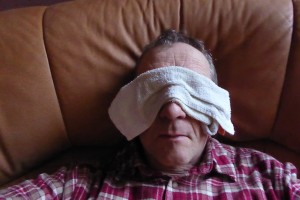
[Today’s blog on the potential harms of psychotherapy is a joint effort. The first half (introduction, methods, results and reflections) was written by Keith Laws and the second half (next steps and J’Accuse) by Samei Huda.]
The emphasis on establishing the efficacy of psychological therapies has historically consigned harms to a largely unchartered hinterland. Information about both the risks as well as benefits, however, is vital if patients are to make informed choices about whether to engage in psychological treatment; in line with the NHS ambition of ‘No decision about me without me’.
We have quite recently seen a publicly funded trial of a psychological intervention halted because of worryingly higher rates of adverse events (overdose, self-harm and suicide attempts) in the intervention arm of the trial (McMurran et al 2011). Two quite different recent reviews (Vaughan et al, 2014; Jonsson et al, 2014) have confirmed the low rates at which adverse events are monitored in randomised controlled trials of psychotherapy.
Most recently, a review of the final reports from National Institute of Health Research (the main public funder of psychological therapy trials in the UK), by Duggan and colleagues (2014) found that not one trial of psychological therapy trial funded between 1995 and 2013 mentioned the occurrence of an adverse event (compared to over two-thirds of RCTs involving drug treatments).

The reporting of adverse events in psychological treatments is weak and the criteria used may not be appropriate.
Methods
The current paper by Crawford and colleagues (2016) adds important novel information to this sketchy and perturbing picture. Crucially they conducted a real-world survey of the negative experiences reported by patients. The National Audit of Psychological Therapies is a large-scale assessment of state-funded psychological therapy services for adults with depression and anxiety in England and Wales. The audit examined clinical records and surveyed people in both primary and secondary care services and approximately 60% (220 services) of all eligible NHS services participated.
Patients aged over 18 and receiving out-patient treatment for anxiety and/or depression were invited to complete an anonymous (online or paper) questionnaire. All who participated expressed whether they had experienced ‘lasting bad effects from the treatment’. The terms ‘lasting’ and ‘bad effects’ were left quite opaque.
Results
Of the large sample of 14,587 participants surveyed:
- 763 (5.2%) slightly or strongly agreed they had experienced lasting bad effects;
- and an additional 1,099 (7.7%) were unsure.
Crawford and colleagues also assessed how various demographic and clinical factors were associated with the experience of lasting bad effects:
- Most patients reported being referred at the right time, offered the right number of sessions and given sufficient information about treatment before it commenced
- Lower reporting of negative effects was associated with various pragmatic variables including whether patients were able to get to appointments without difficulty and whether they were scheduled at convenient times
- Patients aged over 65 (and especially those aged over 75) were less likely to report negative effects than younger patients
- The most striking findings, however, were the much higher rates of long-lasting negative effects of psychological therapy reported both by people from Black and Minority Ethnic groups (BME) and by non-heterosexuals (Lesbian, Gay and Bisexual: LGB).

Both black and minority ethnic people and lesbian, gay and bisexual people reported higher rates of long-lasting negative effects of psychotherapy.
Reflections
Although a figure of 5.2% reporting lasting harm may seem quite small, it needs to be viewed in context. In England alone, the past few years have seen over one million people referred for psychological therapy for common mental disorders, suggesting that as many as 50,000 may have experienced lasting bad effects; and many more left ‘unsure’.
The findings regarding BME and LGB groups are especially worrying. We know that LGB adults have a higher prevalence of poor mental health and lower wellbeing when compared to heterosexuals (Semlyen et al 2016) and this study suggests they are also at greater risk of long-term negative effects following psychotherapy. Similarly, it has been long-known that people from minority ethnic groups experience “persistent inequalities in both experiences and outcomes” in their contact with psychiatric services (Bhui et al 2015) and that UK clinical psychology services “…are failing to meet the psychological and clinical needs of people from minority ethnic groups” (Williams et al 2006). The current survey leads us to the worrying notion that individuals already at increased risk of mental health problems may be more likely to report negative experiences resulting from psychotherapy.
As noted in an accompanying editorial by Scott & Young (2016), the paper by Crawford et al overlooks one extremely large elephant-in-the-therapeutic room -how do therapist characteristics contribute to the negative experiences of therapy? The importance of therapeutic alliance (TA) to outcome has been a consistent theme since the time of Freud and requires more research attention.
It is also worth noting that Crawford et al examined only outpatients diagnosed with anxiety and/or depression. Future studies would need to look at rates of negative experience amongst those with more severe mental disorders. It would also be prudent to investigate the issue of negative effects in younger people, as Parry et al note in the accompanying editorial “negative therapeutic results may be higher for children and young people undergoing psychological therapy”. The study also assesses patients within the NHS and future work might explore the comparable figures in private practice.
We should also be mindful that, like medication, psychological therapies are something of a curate’s egg. As Parry et al (2016) rightly point out in their accompanying editorial piece “it is becoming clear that psychological treatments cannot be at once psychoactive and harmless”. One individual may experience both beneficial and harmful consequences in different areas of their life. Harms and benefits are no more mutually exclusive than they are with medication. The current lack of attention to harms resulting from psychological interventions means that patients are not able to make informed decisions about treatment. The recognition of potential harms has been a remarkably slow, but studies such as this provide crucial information about the experiences of patients.

The current lack of attention to harms resulting from psychological interventions means that patients are not able to make informed decisions about treatment.
[Thanks Keith! Over to you Samei…]
Next steps
As a clinician, should I be warning my patients that if they belong to BME or LGB(T) groups, they have twice the risk of lasting bad effects from psychotherapy? Or should I take into account the flaws in this study, but also remember the reasonably large numbers they did manage to get information from?
At the very least, psychotherapy researchers need to rapidly investigate if this study was a “chance” result or has discovered a significant difference in risk of harm after psychotherapy in some ethnic and sexual orientation groups. If this increased risk from psychotherapy for certain groups is replicated and confirmed, then researchers should investigate if four types of broad explanations are to blame (they may all be present to varying degrees):
- Participants referred for psychotherapy
- Psychotherapy as a treatment model
- Psychotherapists
- The broader contexts in which psychotherapy is delivered
Taking the first possible explanation, about 84% of participants were referred for psychotherapy by professionals such as GPs. They may be inadvertently referring people from ethnic minorities and sexual orientation minorities who are at particular risk of harm from psychotherapy.
Psychotherapy as a treatment model may be more likely to cause harmful effects in certain ethnic groups and minority sexual orientations. We know that certain medicines may be less effective or more likely to cause harmful effects in certain ethnic groups. Perhaps this may apply to psychotherapy (or certain types of psychotherapy) too, but for different reasons.
In psychotherapy, the relationship between the therapist and the client is crucial. It is possible that some therapists are less able to form positive therapeutic relationships with the ethnic and sexual orientation minority groups described above, leading to increased risk of harmful effects. This could potentially be overcome if clients from these minority groups saw therapists from the same minority group as them.
The type of problems that Asian/Chinese/Black/bisexual/other sexual orientation people present with seeking help from psychotherapy may not be best served by the way psychotherapy is delivered to them by the NHS. The pressures IAPT faces are well documented. The delivery of psychotherapy by the NHS may increase the risk of harm to the minority groups described above.
These suggestions I have made are clearly speculative and would need to be examined in a good quality research study. And that’s where the problems begin.

In psychotherapy, the relationship between the therapist and the client is crucial.
J’accuse
The problem with a great deal of psychotherapy research is that it neglects the issue of harm caused by psychotherapy. There is a lack of a standardised terminology to classify and measure these harms (though an accompanying editorial does make some suggestions).
There are some researchers working on this important topic (such as Glenys Parry), but we need qualitative research to identify the different types of harms experienced as a result of psychotherapy and to try and understand the processes leading to it. We then need the development of research methods such as ways of measuring the frequency and severity of these different types of harm identified by qualitative research. We can then move onto properly assessing the extent of harm caused by psychotherapy and how long it persists.
That this has not happened already is puzzling. Psychotherapists try and minimise harm to their clients by therapy through improving their skills by training and discussing cases in supervision. Yet this has not seemed a priority for researchers. Their focus seems to be on proving the effectiveness of therapy and the processes underpinning this.
This reflects a focus on the interests of psychotherapy and psychotherapists but not that of their clients. Clients clearly benefit from evidence of effectiveness but they also benefit from research on harms, which allows them to make informed choices and it helps the therapist minimise further the risk of harms. I can think of few types of treatments outside alternative medicine where there is such poor systematic collection of harmful effects caused by the intervention during research studies, barring details of self-harm and sometimes symptom ratings.
It is time to put the interests of clients first, by seriously researching the harms of psychotherapy. It should also help us understand if the result of this study is true, and what to do about it.

It is time to put the interests of clients first, by seriously researching the harms of psychotherapy.
Links
Primary paper
Crawford MJ, Thana L, Farquharson L, Palmer L, Hancock E, Bassett P, Clarke J, Parry GD. (2016) Patient experience of negative effects of psychological treatment: results of a national survey. The British Journal of Psychiatry Mar 2016, 208 (3) 260-265; DOI: 10.1192/bjp.bp.114.162628 [Abstract]
Other references
Berk M, Parker G. (2009) The elephant on the couch: side-effects of psychotherapy. Australian and New Zealand Journal of Psychiatry, 43(9), 787-794.
Benish SG, Quintana S, Wampold BE. (2011) Culturally adapted psychotherapy and the legitimacy of myth: a direct-comparison meta-analysis. Journal of Counseling Psychology, 58(3), 279. [PubMed abstract]
Interventions designed to improve therapeutic communications between black and minority ethnic people and professionals working in psychiatric services: a systematic review of the evidence for their effectiveness. Health Technol Assess 2015; 19(31).
Dimidjian S, Hollon SD. How would we know if psychotherapy were harmful? Am Psychol 2010; 65: 21–33. [PubMed abstract]
Duggan C, Parry G, McMurran M, Davidson K, Dennis J. (2014) The recording of adverse events from psychological treatments in clinical trials: evidence from a review of NIHR-funded trials. Trials, 15(1), 335.
Jonsson U, Alaie I, Parling T, Arnberg FK. (2014) Reporting of harms in randomized controlled trials of psychological interventions for mental and behavioral disorders: A review of current practice. Contemp Clin Trials. 2014 Mar 4;38(1):1-8. doi: 10.1016/j.cct.2014.02.005. [Epub ahead of print] [PubMed abstract] [Accepted manuscript PDF]
McMurran M, Crawford MJ, Reilly JG, McCrone P, Moran P, Williams H, Adams CE, Duggan C, Delport J, Whitham D, Day F Psycho-education with problem solving (PEPS) therapy for adults with personality disorder: a pragmatic multi-site community-based randomised clinical trial. Trials. 2011 Aug 24; 12():198.
Reuter L, Bengel J, Scheidt CE. Non-response to therapy in acute and rehabilitative psychosomatic inpatient care – a systematic review. Z Psychosom Med Psychother 2014; 60: 121–45 [Abstract]
Scott J, Young AH. (2016) Psychotherapies should be assessed for both benefit and harm. The British Journal of Psychiatry, 208(3), 208-209. [Abstract]
Semlyen J, King M, Varney J, Hagger-Johnson G. (2016) Sexual orientation and symptoms of common mental disorder or low wellbeing: combined meta-analysis of 12 UK population health surveys. BMC Psychiatry, 16(1), 1-9.
Vaughan B et al. (2014) Frequency of reporting of adverse events in randomized controlled trials of psychotherapy vs. psychopharmacotherapy. Compr Psychiatry. 2014 Jan 23. pii: S0010-440X(14)00006-6. doi: 10.1016/j.comppsych.2014.01.001. [Epub ahead of print] [PubMed abstract]
Williams PE, Turpin G, Hardy G. (2006) Clinical psychology service provision and ethnic diversity within the UK: a review of the literature. Clinical Psychology & Psychotherapy 13.5 (2006): 324-338. [Abstract]
Psychotherapy trials should report the side effects of treatment

The harms of psychotherapy: are BME and LGBT communities more at risk? https://t.co/SKKz1qNWNF #MentalHealth https://t.co/BZrSkeDfqM
La psicoterapia también produce daños y efectos adversos. Mayor riesgo en comunidades minoritarias
https://t.co/J5WaRhmKFt
Blog by @Keith_Laws and I on harms caused by psychotherapy https://t.co/mnis1nGw4A Are ethnic minorities particularly at risk?
Is psychotherapy more likely to harm you if you are from an ethnic or sexual minority ? https://t.co/mnis1nGw4A
Today @Keith_Laws @SameiHuda on patient experience of negative effects of psychological treatment https://t.co/A08Wo8UVqk
Morning @glenys_parry Interested in your thoughts on our blog today https://t.co/A08Wo8UVqk #psychotherapy #harms @SameiHuda @Keith_Laws
@Mental_Elf @glenys_parry @SameiHuda @Keith_Laws fantastic blog & thought: psychological treatment can’t be at once psychoactive & harmless
@Mental_Elf @SameiHuda @Keith_Laws Important blog, asking the right questions. Want to continue trying to find answers.
Why do psychotherapy researchers often neglect to measure & report the harm caused by psychotherapy? https://t.co/A08Wo8UVqk
@sandycann2 seen our blog? https://t.co/mnis1nGw4A
We lack consensus on how to define, classify & assess psychotherapy side-effects, unwanted events, adverse reactions https://t.co/A08Wo8UVqk
The harms of #psychotherapy: are #BME and #LGBT communities more at risk? https://t.co/x0ZXIhOqFh @Mental_Elf looks at the #evidence
Patient reported lasting negative effects following #psychotherapy @Mental_Elf @SameiHuda @Keith_Laws https://t.co/IA5r57DBIO
@Zia_Julia @Mental_Elf @SameiHuda @Keith_Laws Would you kindly re-send the link. This one is broken
@FEM4Ever @Zia_Julia @Mental_Elf @Keith_Laws seems to work when I try it. What platform u using ?
@SameiHuda @Zia_Julia @Mental_Elf @Keith_Laws oh just worked. Thanks!
To make informed choices, patients need information about negative as well as positive effects of treatments https://t.co/A08Wo8UVqk
Article about the potential ‘side effects’ of psychotherapy here (https://t.co/u84Dq7e1PJ). https://t.co/8vSA2B8KoT
The harms of psychotherapy: BME & LGBT more at risk? https://t.co/uAFCrc3PIx
RT @djrobotham: Has implications, i.e., should therapies be designed/delivered with diversity in mind? (https://t.co/Fp4FylLsAA) https://t.…
RT @JuanGrvas: Los daños de las terapias psicológicas. Máyores en lesbianas, gay y bisexuales, y en minorías étnicas.
https://t.co/pB9YdPR…
@BPSOfficial a blog on harm caused by psychotherapy. Increased risk for ethnic & sexual minorities? https://t.co/mnis1nGw4A
RT @Mental_Elf: 1 in 20 people responding to recent survey reported lasting bad effects from psychological treatment https://t.co/A08Wo8UVqk
RT @Mental_Elf: Psychotherapy survey of 14,587 ppl finds 5.2% slightly or strongly agreed they’d experienced lasting bad effects https://t.…
Hello #bpsconf tweeps! :-) I wonder what you think of our blog today on the harms of psychotherapy? https://t.co/A08Wo8UVqk
The harms of psychotherapy: are BME and LGBT communities more at risk? https://t.co/9Dbzgs8Kfe via @sharethis
This is interesting: ‘The harms of psychotherapy: are BME and LGBT communities more at risk?’ https://t.co/r9MmMi9V6s via @Mental_Elf
Survey finds people from BME & LGB groups report much higher rates of adverse effects from psychotherapy https://t.co/A08Wo8UVqk
@Mental_Elf until therapists, clinicians etc own &address their internalised prejudices, this will continue 2b a prob, tho multifactorial.
@AmyJebreel @Mental_Elf also BME under-represented in the psychotherapy profession. A challenge for recruitment to the scaffolding of theory
“Although a figure of 5.2% reporting lasting harm may seem quite small”
I’d suggest that thinking of it as “1 in 20” – as you might present it to someone weighing up treatment options, for example – it seems rather high.
RT @Mental_Elf: It is time to put the interests of clients first, by seriously researching the harms of psychotherapy https://t.co/A08Wo8UV…
Time to research harms psychotherapy say @Keith_Laws & @SameiHuda https://t.co/1AxTBBuv3t 1995-2013 no psych trial mentioned adverse event
The harms of psychotherapy: are BME and LGBT communities more at risk? https://t.co/dMUKpE4XQS via @sharethis
RT @Mental_Elf: Clinicians should discuss potential for both positive & negative effects of therapy before it starts https://t.co/A08Wo8UVq…
Why do black and minority ethnic people report higher rates of long-lasting negative effects of psychotherapy https://t.co/A08Wo8UVqk
Why do lesbian, gay & bisexual people report higher rates of long-lasting negative effects of psychotherapy https://t.co/A08Wo8UVqk
@Mental_Elf but do they?
RT @Mental_Elf: Don’t miss – The harms of psychotherapy: are BME & LGBT communities more at risk? https://t.co/A08Wo8UVqk #EBP
The harms of psychotherapy: are BME and LGBT communities more at risk?
https://t.co/pMQo2kSu1E via @sharethis
The harms of psychotherapy: are BME and LGBT communities more at risk? https://t.co/uzGSyJxUWX
Why are ethnic & sexual minorities more at risk of harm from therapy? What should we do @AnneCooke14 @peterkinderman https://t.co/mnis1nGw4A
More research on potential harms of psychotherapy needed 4 patients to make informed treatment decisions @Mental_Elf https://t.co/9qX3qVPeBK
RT @johnthejack: ICYMI: time to research harms of psychotherapy say @Keith_Laws & @SameiHuda https://t.co/1AxTBBuv3t #MEcfs
@CoyneoftheRealm is it time for psychotherapy research to investigate potential harm seriously ? https://t.co/CLqHAWakg6
RT @Mental_Elf: Reporting of adverse events in psychological treatments is weak & the criteria used may not be appropriate https://t.co/A08…
The Potential Harms of #Psychotherapy: https://t.co/RBHExS3kpg via @Mental_Elf @Keith_Laws @SameiHuda #Anxiety https://t.co/ogsyPTxpBQ
.@Mental_Elf @Keith_Laws @SameiHuda What are the kind of harms (other than those you mention) likely associated with psychotherapy I wonder.
@Firestormmer @Mental_Elf @Keith_Laws @SameiHuda As a psychotherapist pre-illness, psychotherapy is a tool, like a knife, can cure or kill.
@Firestormmer @Mental_Elf @Keith_Laws @SameiHuda good therapy applied to support can be helpful, quack ideas ill applied are harmful.
@OCDTrudy That’s awful. And they never consider the harms. https://t.co/1AxTBBuv3t
The harms of psychotherapy: are #BME and #LGBT communities more at risk? https://t.co/E9b7GtWLfX TY @Mental_Elf ! @AlfPezzella @AlisonF101
Most popular blog this week? It’s @Keith_Laws @SameiHuda The harms of #psychotherapy https://t.co/A08Wo8UVqk #bpsconf
[…] evidence about the potential harms of psychotherapy from previous blogs (Langford & Laws 2014; Laws & Huda, 2016). The publication of the Negative Effects Questionnaire (NEQ; Rozental A et al, 2016) signifies a […]
I’d just finished reading a descriptive account of what people get into when taking on psychotherapy in the “Positive Psychology Program” When I read this one. In the description in the PPP, I was struck by the focus on outcome. The author was not ignorant of the necessity for there to be a respectful engagement but it seemed to be a means to an end. Wampold and Imel’s recent work makes it clear from meta-analyses, that CBT improves things for a while but doesn’t last for most of those treated. There is a need for engagement that supports client ownership of understanding and outcome. My own way of working is informed by relationship quality and this means that the latent expertise for recovery is in the client. Rogers, now passed on, knew this and made it plain how to achieve lasting outcome – but it can’t be done in the ten sessions envisaged by CBT graduates here in Australia. The ten sessions, incidentally, are part of government pressure for Medicare funding. All very businesslike but not very realistic when people are suffering.
George Wills (Phd, M.Psych, Dip Psych. FAPS)